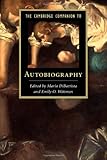The Cambridge Companion to Autobiography / edited by Maria DiBattista, Emily Wittman.
Material type: TextSeries: Cambridge Companions to LiteraturePublisher: New York : Cambridge University Press, 2014Description: xix, 259 pages ; 24 cmContent type:
TextSeries: Cambridge Companions to LiteraturePublisher: New York : Cambridge University Press, 2014Description: xix, 259 pages ; 24 cmContent type: - text
- unmediated
- volume
- 9781107028104 (hardback)
- 9781107609181 (paperback)
- 809/.93592 23
- CT25 .C355 2014
- LIT004120
| Item type | Current library | Home library | Call number | Status | Date due | Barcode | |
|---|---|---|---|---|---|---|---|
 Book
Book
|
Dept. of Hindi Reference | Dept. of Hindi | 809.935DIB/C (Browse shelf(Opens below)) | Available | HIN13881 |
Browsing Dept. of Hindi shelves, Shelving location: Reference Close shelf browser (Hides shelf browser)

|
No cover image available No cover image available |

|

|

|

|

|
||
| 800 SHA/M Masterpiece of World literature | 807 GOR/S Studying literature:the essential companion | 808 HER/C Cambridge companion to narrative | 809.935DIB/C The Cambridge Companion to Autobiography / | 809.894 POU/E European literary history : an introduction / | 809.91 STI/B Beginning at the End | 809.911 ARM/M Modernism : a cultural history / |
Includes bibliographical references and index.
Machine generated contents note: Introduction Maria DiBattista and Emily O. Wittman; Part I. Foundations: 1. Augustine Adam Becker; 2. Medieval European autobiography John Fleming; 3. Montaigne Lawrence Kriztman; 4. Rousseau Eli Friedlander; Part II. Consolidations: 5. Romantic autobiography Frances Wilson; 6. Victorian autobiography Deborah Nord; 7. American autobiography Robert Sayre; Part III. Deflections: 8. Kierkegaard/Nietzsche Alistair Hannay; 9. Pessoa Alfred MacAdam; 10. Gide/Genet Jean-Michel Rabate;; Part IV. Prisms: 11. Nabokov Leland de la Durante; 12. African American autobiography Trudier Harris; 13. Holocaust memoirs Michael Bernard-Donals; 14. Women's autobiographies Maria DiBattista; 15. The 'new' memoir Patrick Madden; 16. Creative non-fiction Mary Cappello.
"The Cambridge Companion to Autobiography offers a historical overview of the genre from the foundational works of Augustine, Montaigne, and Rousseau through the great autobiographies of the Romantic, Victorian, and modern eras. Seventeen essays from distinguished scholars and critics explore the diverse forms, audiences, styles, and motives of life writings traditionally classified under the rubric of autobiography. Chapters are arranged in chronological order and are grouped to reflect changing views of the psychological status, representative character, and moral authority of the autobiographical text. The volume closes with a group portrait of late-modernist and contemporary autobiographies that, by blurring the dividing line between fiction and non-fiction, expand our understanding of the genre. Accessibly written and comprehensive in scope, the volume will appeal especially to students and teachers of non-fiction narrative, creative writing, and literature more broadly"-- Provided by publisher.
There are no comments on this title.

